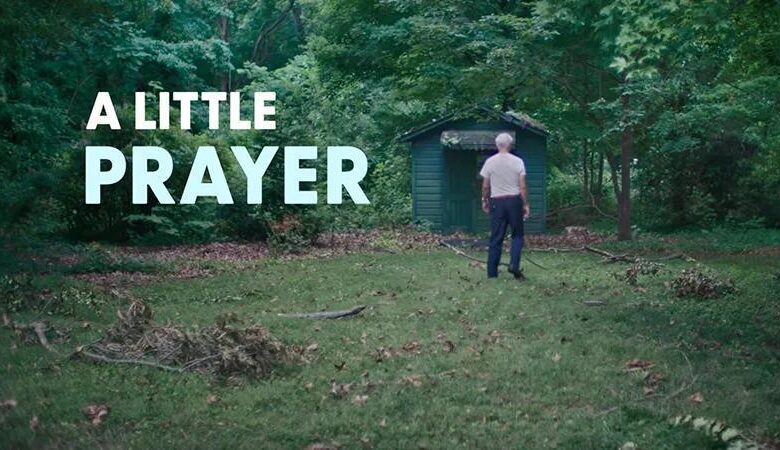Angus MacLachlan’s A Little Prayer unfolds not with the thunder of melodrama, but with the soft, insistent rhythms of ordinary life. Set in suburban North Carolina, the film orbits around Bill, a gentle Vietnam veteran played with restrained gravitas by David Strathairn, as he confronts the unspoken fractures within his family. What emerges is a film as much about silence as about speech, as much about absence as about presence. In its smallness, A Little Prayer discovers a rare, disarming depth.
At its core, the film examines what it means to carry moral responsibility in the shifting terrain of family. Bill finds himself torn between loyalty to his son David, a veteran consumed by restlessness and infidelity, and his daughter-in-law Tammy, portrayed with delicate resilience by Jane Levy. Where David drifts into secrecy and betrayal, Tammy embodies a quiet endurance, her politeness shielding both sorrow and strength. In Bill’s tentative efforts to protect Tammy, MacLachlan locates the film’s true heartbeat: a cross-generational intimacy that resists neat categorization. Bill becomes, in effect, a second parent to her, and the relationship blossoms into one of the most unexpected yet genuine dynamics in recent American independent cinema.
Yet MacLachlan resists the urge to sanctify his characters. Bill, despite his moral clarity, is not immune to failure. His stoicism, rooted in military discipline and generational expectations of masculinity, can at times border on paralysis. He loves deeply but struggles to translate that love into action. The same restraint that makes him admirable also makes him limited, a man whose decency cannot undo the damage of his son’s choices. Tammy, too, is more than a victim; she is a woman navigating not only betrayal but the precarious balance between dependence and self-determination.
Thematically, A Little Prayer is concerned with the burdens of secrecy and the fragile hope of forgiveness. Infidelity is the narrative spark, but it is not the destination. Rather, it becomes a lens through which MacLachlan explores the more intractable questions of how families endure—when to intervene, when to forgive, and when to let go. The title itself gestures toward spirituality, yet the film never sermonizes. Faith appears less as doctrine than as atmosphere, an invisible undercurrent in the gospel songs that float through scenes and in the characters’ halting gestures toward grace.
Stylistically, the film mirrors its thematic restraint. MacLachlan’s camera lingers without intrusion, capturing moments of hesitation and silence with the same weight as confession or confrontation. The cinematography situates the characters in a North Carolina that feels both specific and timeless: porches at dawn, quiet streets, workplaces suffused with routine. Editing is unhurried, allowing scenes to breathe, often ending not with resolution but with ambiguity. Some viewers may find this pacing sluggish, but for others, it will feel like a profound invitation to dwell in the spaces between words.
If the film has a weakness, it lies in this very commitment to subtlety. There are no cathartic crescendos, no revelatory speeches, no melodramatic clashes. For audiences accustomed to the rhythms of traditional family dramas, A Little Prayer may feel too understated, its emotional peaks too quiet to register. Yet in that quietness lies its distinct achievement. By refusing spectacle, the film insists on a more faithful rendering of life’s moral entanglements: rarely explosive, often unresolved, always complicated.
In the end, A Little Prayer is less a story of betrayal than a meditation on endurance. It asks how one continues to love amidst disappointment, how one forgives without forgetting, how one parents long after children have grown. MacLachlan offers no easy answers, only a collection of lives brushed with tenderness and regret, each gesture of care a kind of prayer in itself.
In its restraint, the film achieves something rare: it honors the quiet dignity of ordinary struggle. For those willing to listen closely, A Little Prayer whispers truths that louder films too often miss.

